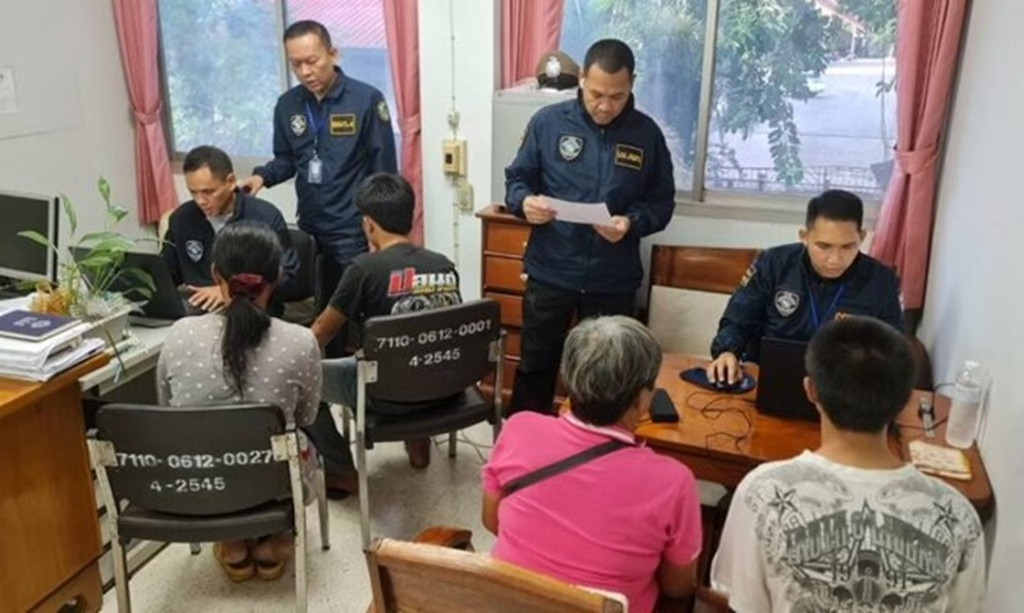CHIANG RAI – Cyber Police have smashed a major mule-account ring, arrested recruiters who lured minors to open bank accounts, and the monthly turnover tops 100 million baht in Chiang Saen and Mae Sai districts, Chiang Rai.
On Tuesday, Pol Lt Gen Surapol Prembutr, Commissioner of the Cyber Crime Investigation Bureau (Cyber Police), received a report from officers of Sub‑Division 4, Division 4, who teamed up with Sub‑Division 3, Division 4. The joint team moved to dismantle a large mule‑account operation.
Investigators found widespread illicit sales of mule bank accounts to online gambling operators and call centre scam groups in these areas. The network targeted children and teenagers, tricking many into opening accounts that were later sold on.
Evidence pointed to Ms Waralee and Mr Khajorn, a married couple, who acted as cash withdrawers for online gambling financiers and call centre gangs. Ms Wichayaporn, surname withheld, served as the account consolidator. Police compiled evidence and secured arrest warrants.
On 14 Oct 2025, officers arrested Ms Waralee and Mr Khajorn in Mueang Chiang Rai and detained Ms Wichayaporn in Chiang Saen. Many minors were found to be involved. Police did not press charges against the children and interviewed them to obtain information for further action.

Cyber Police Question Suspects
The inquiry showed that Ms Wichayaporn sourced mule accounts for major backers in Chiang Saen and Mae Sai. She recruited local youths for hire to open accounts. In the past two months, she was widely discussed on social media as part of a brazen mule‑account group and was accused of assaulting people who had opened accounts in Chiang Saen.
Financial analysis revealed that the accounts received proceeds for gambling sites, with funds moving in excess of 100 million baht each month. Money was then transferred to a network of more than ten mule accounts. Police sought court warrants to arrest Ms Waralee and Mr Khajorn for withdrawing cash on behalf of gambling operators.
Checks showed that every account receiving transfers from Ms Wichayaporn belonged to minors. During questioning, she admitted she recruited local youths to open accounts.
She paid 3,000 baht per account, then resold each for 9,000 baht to a major mule stable in Mae Sai. That group then sold the accounts to gambling platforms and call centre gangs for 30,000 baht.
Stricter action by state agencies and banks has pushed up the black‑market price of mule accounts. The going rate used to be about 5,000 baht, and has climbed several times higher.
Interviews with affected youths showed many had received police summons from multiple jurisdictions and faced different charges. This confirmed that their accounts were used by call centre gangs. Division 4 officers will continue to expand the investigation and pursue further arrests.
Crackdown on Mule Accounts
Mule accounts are bank accounts that scammers use to wash money from online fraud, call-centre schemes, and cybercrime. These accounts are often rented from people for a fee, sometimes without full consent. Since 2022, they have been linked to losses of more than 100 billion baht.
In late 2023, the state began a major crackdown under the Emergency Decree on the Prevention and Suppression of Online Crime, then ramped it up in 2025 with joint action across agencies.
The Bank of Thailand (BoT), Anti-Money Laundering Office (AMLO), Cyber Crime Investigation Bureau (CCIB), and Securities and Exchange Commission (SEC) lead the charge. New rules that took effect on 31 January 2025 block transactions to or from suspected mule accounts and require instant warnings for risky transfers.
Banks now pool data to spot patterns, moving from account-based checks to person-based monitoring. If someone is flagged, all electronic services can be frozen across banks. The Anti-Online Crime Operation Centre (AOC 1441) also verified more than 120 million SIM cards in November 2024 to tie numbers to real users and stop fake registrations.
The results came fast. By March 2025, 135,279 mule accounts were shut, and 869 suspects were arrested. Since the decree began, authorities have counted 582,548 account closures and 5,399 arrests.
The SEC focused on crypto-linked mules, freezing 31,216 accounts worth 229 million baht in 2025. Operation Breaking the Criminal Bridge mapped more than 500,000 active mule accounts, in line with Prime Minister Paetongtarn Shinawatra’s orders.
The downside has been hard to ignore. Many innocent Thais, from stallholders to expats and small firms, saw sudden freezes. Some rushed to withdraw cash, which fed talk of a banking scare. A Suan Dusit Poll in September 2025 found 70% of people fear wrongful suspensions.
Trust has taken a hit, even though banks set up war rooms for quick checks, often clearing cases within a day. Critics say screening is too broad and want tighter rules to protect honest users.
The drive is key for financial safety, yet it raises questions about rights and due process. Lawmakers are now pushing for clearer standards and fair reviews, so Thailand’s digital economy can grow without sweeping up people who have done nothing wrong.















